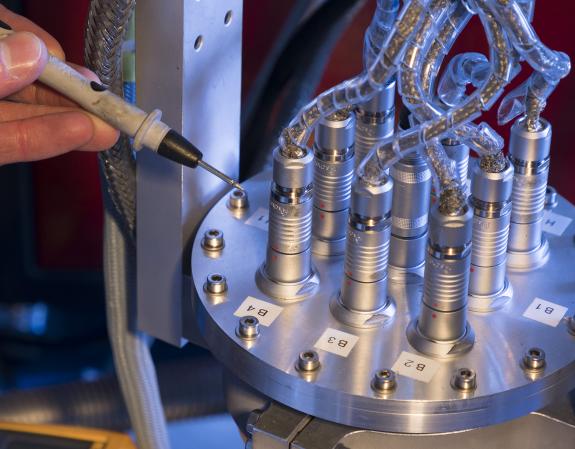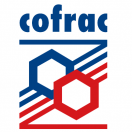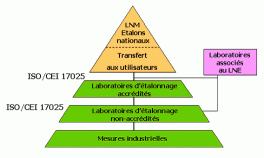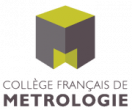
The French Metrology really began to be structured in 1969. And later, Through the decree of January 25, 2005, the management of the French Metrology was entrusted to the LNE. National metrology activities have since been organized within a National Network of French Metrology (Réseau National de la Métrologie Française - RNMF) and federated by the LNE.
Organization of the French Metrology
The LNE: leader of French metrology
The LNE thus became the counterpart of the biggest national metrology institutes (PTB in Germany, NPL in the United Kingdom, INRIM in Italy, NIST in the United States, NMIJ in Japan...) and represents France in the organization of the Metre Convention (International Committee of Weights and Measures - CIPM, Consultative Committees of the CIPM...), and in international and European organizations such as EURAMET.
A Metrology Committee
A Metrology Committee has been constituted within the LNE, an authority issuing recommendations on the scientific and strategic orientations of the LNE’s Board of Directors. Bringing together twenty four personalities from the scientific and industrial areas, as well as representatives from the concerned ministries (Ministries of Industry and Research), the Committee makes sure that the works are directed towards the fields deemed priority, and reinforces the complementary of investments, and creates joint units of researchers whenever possible.
The Scientific Committees
The Metrology Committee is helped by several Scientific Committees and the LNE's Scientific and Technological Research Division (DRST).
There are 7 Scientific Committees, organized per metrological domain:
- electricity-magnetism,
- ionizing radiation,
- temperature and thermal quantities-optical radiation,
- time-frequency,
- length and dimensional quantities-mass and related quantities,
- amount of substance,
- mathematics and statistics
Each committee is composed of about fifteen scientific experts in those fields.
The DRST helps the Metrology Committee and the Scientific Councils in the meetings preparation, follow-up and makes proposals for different programmes and works to be carried out.
The players of French metrology since the 1st January 2005
Owing to their history, the studies and research projects in scientific and industrial metrology are carried out by several laboratories of different public or private bodies. Since 2005, the Government has entrusted LNE with responsibility for steering and running the network of laboratories constituting French Metrology (Réseau National de la Métrologie Française - RNMF).
The RNMF is composed of 10 laboratories: the National Metrology Institute (NMI) of France, which is the LNE, and 9 Designated Institutes (DIs) for specific fields and which skills are complementary of the LNE’s.
- LNE: the French NMI
- The Designated Institutes (DIs):
· LNE-LNHB at CEA
· LNE-OP at l’Observatoire de Paris
· LNE-LCM at CNAM
· LNE-CETIAT
· LNE-ENSAM
· LNE-IRSN
· LNE-LADG
· LNE-LTFB
· LNE-Trapil
All the scientific activities (involving all laboratories, NMLs and ALs) bring together some 220 researchers in metrology. All the laboratories, cited hereafter, have their missions defined by the Metrology Committee and are declared under the MRA (Mutual Recognition Arrangement) published by the CIPM (International Committee of Weights and Measures).
Missions of the RNMF’s laboratories
LNE-LCM / CNAM
Laboratoire commun de métrologie
The metrological activity of the LNE-LCM is structured around four areas corresponding to four base units of the International System of Units (SI), the kilogram, the metre, the candela and the kelvin, consists in:
- Maintenance and study of the stability of the national prototype of the kilogram;
- Realization and transfer of the multiples and sub-multiples of the kilogram as well as most quantities related to mass: pressure, force, torque, viscosity, accelerometry, volume, density;
- Realization and transfer of the length unit via the mise en pratique of the definition of the metre; dimensional metrology (angle, gauge blocks, 3D mesurements, nanometrology...);
- Materialisation of the units of luminous intensity and of the other photometric and radiometric quantities, for the detectors as well as for the sources or filters;
- Traceability of the users to the national references for radiometry and photometry, throughout the entire optical domain (UV, visible and IR), by setting up calibration benches for detectors, sources (lamps or lasers) or materials (reflection, transmission, emissivity);
- Realization of the national temperature references, i.e. materialisation of the International Temperature Scale (ITS-90) and of the Provisional Low Temperature Scale (PLTS-2000).
- Implementation of the means to transfer national temperature references to users, and for the thermal quantities; materialization of the references and the matching calibration benches;
LNE
Direction Métrologie Scientifique et Industrielle – Scientific and Industrial Metrology Department
The metrology activity of the LNE is structured around different fields for:
- Creation and improvement of primary standards for measuring quantities in electricity and magnetism (current, voltage, impedance, energy, power, etc.) and national references for the calibration of instruments used in industry;
- Development of highly advanced metrological methods and instruments for electrochemistry and analysis in organic, inorganic and gas chemistry, and ensure transfer to users.
- Development of mathematical and statistical tools for metrology (software, uncertainty assessment methods, etc.)
LNE-LNHB / CEA
Laboratoire National Henri Becquerel
The LNE-LNHB is, among the national metrology laboratories, the one which is responsible for the field of ionising radiation. It ensures the definition, maintenance and the improvement of the national standards in the areas of radioactivity and dosimetry. It is also in charge of the transfer of these national references to the users (industry, environment, health...).
LNE-OP / Observatoire de Paris
Observatoire de Paris
The LNE-OP is responsible for producing primary and secondary frequency standards, as well as creating and disseminating the national time reference, UTC(OP), the basis of legal time in France. He is also in charge of national gravimetry references.
LNE-CETIAT
Centre Technique des Industries Aérauliques et Thermiques
The LNE-CETIAT is implementing the national references in hygrometry, in anemometry and in liquid (water) flow measurement and is developing the means to transfer the references to the industry.
LNE-ENSAM
Ecole National Supérieure d’Arts et Métiers - Paris
The Dynamic Metrology Laboratory, the LNE-ENSAM is in charge of the implementation and the improvement of the national references in dynamic pressure and of the development of means to transfer the references to the industry.
LNE-IRSN
Institut de Radioprotection et de Sûreté Nucléaire
The LNE-IRSN is responsible for the national references in the field of neutron dosimetry. It acts as a support and a complement to the LNE-LNHB in that field, following the known national reference that is the manganese bath.
LNE-LADG
Laboratoire Associé de Débitmétrie Gazeuse
The LNE-LADG constitue the Research and Development department of the CESAME-EXADEBIT company, settled in Poitiers. It is responsible for the implementation and the improvement of the national references in high and low pressure gas flow measurement (0,1 - 80 000 m3⋅h-1) and of the development of the means to transfer the references to the industry.
LNE-LTFB
Laboratoire Temps Fréquence de Besançon
LNE-LTFB includes the calibration activities accredited by the COFRAC which are not covered by the LNE-OP: frequency, time interval, short time (0,1 s to 100 s) and long time (more than 1 hour) stability, phase noise. Moreover, LNE-LTFB also ensure the diffusion of national frequency standards by GPS link (for more information see the Cofrac Website: HTTP://WWW.COFRAC.FR).
LNE-TRAPIL
Trapil company
The metrology laboratory associated with the LNE (LNE-TRAPIL) is implementing the national references for liquid flow –other than water- measurement, primarily for the liquid hydrocarbons, and is developing means for the transfer of these references to the industry.
Partners
AFNOR
AFNOR is an international services group. It designs and deploys solutions based on voluntary standards around the world.
As a national standardization body, AFNOR ensures the representativeness and defence of the interests of French socio-economic players. It is the gateway to the game of influence that makes it possible, at national, European and international level, to define the rules that save time and structure markets. From the study of new subjects to standards publication and update, AFNOR is present at all levels and helps identify development opportunities for companies and local authorities.
As a provider of business intelligence, training, measurement, certification and evaluation solutions, the group also operates in the competitive field. Companies and local authorities can rely on the AFNOR group to inform, control their environment, strengthen, stand out and compare themselves. 74,000 customers, including 11,000 abroad, already trust it. 75% are SMEs and VSEs.
LNE is a partner of the AFNOR group essentially in two capacities. The first concerns standardisation. LNE and RNMF laboratory experts participate in standardization commissions and working groups for the development and formalization of standardization projects (national or international) prior to dissemination and approval. The second is certification, since LNE is mandated to issue certain NF brand applications.
COFRAC
The COFRAC (Comité Français pour l'Accréditation) is a non-profit making association under the law of 1901, created in 1994, taking over the activities of the BNM-FRETAC (Bureau national de métrologie - France Etalonnage Accréditation) and the RNE (Réseau National d'Essais).
The aim is to allow laboratories and organizations receiving accreditation by COFRAC, giving a proof of their skills, so that they can offer companies, consumers and the authorities, a guarantee of confidence in the services performed by the accredited laboratories and bodies.
To achieve this purpose, COFRAC is structured around sectors of activity:
- laboratories (for tests and calibrations);
- inspection;
- certification (companies and employees, industrial products and services, agricultural and food products).
Accreditation must be a rigorous process, backed up by expertises. Within the framework of the activities for accreditation of the calibration laboratories and support to the national calibration chains, the LNE participates in the accreditation process and in the reliability of the accreditation in several ways:
- participation of numerous LNE experts in the laboratory audits;
- participation of numerous LNE experts in the Technical Accreditation Commissions;
- realization of national inter-laboratory comparisons: organization and implementation of the national inter-laboratory comparisons by the National Metrology Laboratories (NMLs) and the Associate Laboratories (ALs), and manage these comparisons.
These comparisons allows to corroborate and validate the measurement uncertainties requested by the laboratories during the accreditation; - organisation of technical workshops.
To make trading transactions easier and demonstrate the proof of product quality abroad, recognition agreements have been set up. The COFRAC therefore signed, in the context of the EA (European Co-operation for Accreditation), a European mutual recognition agreement for the tests, calibrations and certification. The COFRAC has also signed equivalent international agreements for the tests and calibrations as part of the ILAC (International Laboratory Accreditation Co-operation) and for the certification of quality systems in the context of the IAF (International Accreditation Forum).
Collège Français de Métrologie
The Collège Français de Métrologie (CFM) was created as an association under the law of 1901 in May 2002, taking over from the Collège de Métrologie. Its aim is to promote industrial metrology by carrying out appropriate collective actions:
- Identify the needs that enterprises and organizations must fulfil in the field of metrology,
- Disseminate the metrological culture and knowledge in the industrial, scientific and commercial environment,
- Be the exchange forum for people concerned with metrology,
- Contribute to coherent collective actions on national and regional levels,
- Undertake any suitable action in order to promote and develop metrology.
The LNE is an ex officio member of the Board of Directors of the Collège français de métrologie. It brings the Collège its technical and scientific skills in metrology and acts as interface with the foreign national metrology laboratories.
As a member of the organisation committee and of the Scientific and technical committee of most metrology congresses organised by the Collège, the LNE provides active support with the organisation as well as the various communications.



